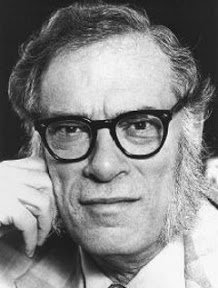 Back in the day I was a huge fan of Isaac Asimov. Many people know him as a science fiction writer, which of course he was, but he’s less well-known as a writer of science. That’s a pity, because he was a very gifted communicator. It’s probably his writing more than any other that gave me my interest in the natural sciences. Asimov, was of course an atheist and so I often found what he had to say a great challenge but I thought then, and still think now, that the wrestling was worth it.
Back in the day I was a huge fan of Isaac Asimov. Many people know him as a science fiction writer, which of course he was, but he’s less well-known as a writer of science. That’s a pity, because he was a very gifted communicator. It’s probably his writing more than any other that gave me my interest in the natural sciences. Asimov, was of course an atheist and so I often found what he had to say a great challenge but I thought then, and still think now, that the wrestling was worth it.
One of the books I enjoyed most was a collection of essays entitled “The Planet That Wasn’t”. I must have got my hands on it around 1976/7 I suppose. Sadly, I don’t seem to be able to find it, and I don’t think it is in print any longer. I dare say that some of the information in it is outdated anyway. There was one article I remember particularly as the one that put me on to the notion that science has political consequences. I think it was called “The smell of electricity”, but I could be mistaken1. Anyway, this was an article about ozone, and the effect that refrigerant chemicals (he called them freons, but we’d call them CFCs today) might have on the ozone layer that shields the earth’s surface from damaging UV light. His conclusion was that, given the nature of the threat, finding alternatives to the use of these chemicals would be a sensible move, and that right smartly. I nodded my wise teenage head in agreement, and read the next essay.
What I didn’t know at the time was anything at all about the way the chemical industry reacted to the suggestion of this problem, but it is instructive to remember because in many ways that argument in the 70’s parallels the current ‘debate’ about climate change and in fact some of the characters who stoked ’skepticism’ about the damaging effects of CFCs have since become champions of the anti-AGW crowd.
If you need reminding of the way that debate went, have a look at The Skeptics vs The Ozone Hole. If that seems to much to ask, just consider the conclusion:
Luckily, it appears that serious damage to the planet was averted with the swift implementation of the Montreal Protocol. Unfortunately, it appears that we have not learned our lesson from the past 30 years’ experience with the ozone-CFC debate. Once again, we find a theory that has wide support in the scientific community being attacked by a handful of skeptics, publishing outside of the peer-reviewed scientific literature, their voices greatly amplified by the public relations machines of powerful corporations and politicians sympathetic to them. The skeptics have trotted out the same bag of tricks used in the CFC-ozone depletion debate, this time to delay any response to the threat of global warming. And once again, it will likely take a disaster to change things–unless we wise up to their tricks.Luckily, it appears that serious damage to the planet was averted with the swift implementation of the Montreal Protocol. Unfortunately, it appears that we have not learned our lesson from the past 30 years’ experience with the ozone-CFC debate. Once again, we find a theory that has wide support in the scientific community being attacked by a handful of skeptics, publishing outside of the peer-reviewed scientific literature, their voices greatly amplified by the public relations machines of powerful corporations and politicians sympathetic to them. The skeptics have trotted out the same bag of tricks used in the CFC-ozone depletion debate, this time to delay any response to the threat of global warming. And once again, it will likely take a disaster to change things–unless we wise up to their tricks.
This is a reblog from 2012, and I think I first posted it in 2010.
- Indeed, I was mistaken. My copy of this lovely book has turned up and though there is an essay in there called ‘The smell of electricity’ which is about ozone, the one I remembered was ‘A change of air’. The article was originally published in February 1976. ↩︎
Leave a Reply